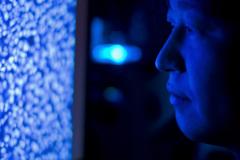Gene Therapy Research Proposal Nets CAREER Award for Chemical Engineering Assistant Professor
Young Jik Kwon to study improving delivery of medical treatment to patient cells
 Young Jik Kwon, Ph.D., assistant professor of chemical engineering and materials science, pharmaceutical sciences, and biomedical engineering, has received a five-year, $500,000 Faculty Early Career Development (CAREER) Award from the National Science Foundation. Kwon’s proposal, titled “CAREER: Acid-transforming Polypeptides as Stimuli-responsive, Efficient, Biocompatible, and Tunable Nonviral Gene Carriers,” will explore advances in nonviral gene delivery for gene therapy treatments.
Young Jik Kwon, Ph.D., assistant professor of chemical engineering and materials science, pharmaceutical sciences, and biomedical engineering, has received a five-year, $500,000 Faculty Early Career Development (CAREER) Award from the National Science Foundation. Kwon’s proposal, titled “CAREER: Acid-transforming Polypeptides as Stimuli-responsive, Efficient, Biocompatible, and Tunable Nonviral Gene Carriers,” will explore advances in nonviral gene delivery for gene therapy treatments.
Gene therapy, or the delivery of treatment to cells using a gene vector, is a promising area of medical treatment for numerous serious diseases such as cancer. Current vectors, however, are easily degraded in the body, and their effectiveness in delivering the genes to target cells in the body remains low.
Kwon works with non-viral, synthetic vectors, which have a lower transfer rate of the desired gene information to the body’s cells. His challenge is to find a way to deliver the genes that counteract the cells’ tendency to fight foreign DNA and release the genetic materials instead of it being “digested” in the cells.
Kwon starts with a semi-synthetic polypeptide, and using the same principle that allows soap to remove dirt from clothes, is developing a gene delivery mechanism that will transfer the nucleic acid into the intracellular target of diseased cells while the polypeptide gene carriers break off and are absorbed into the body.
Kwon’s CAREER Award will support research that takes this principle one step further to create hybrid gene therapy delivery molecules. By starting with the semi-synthetic polypeptide and incorporating different pieces from other polypeptides, each with its own role, Kwon believes it will be possible to molecularly control traffic to the cells to obtain the maximum therapy delivery effects. For example, cancer cells can be efficiently eradicated by expressing a gene stimulating programmed cell death, called apoptosis. By thinking about the gene therapy delivery molecules like Legos that can be built upon to create new vectors, Kwon hopes to build biocompatible, biodegradable, effective delivery systems.
As part of the educational component of the CAREER award, Kwon will incorporate undergraduate research programs into this research, including chemical engineering, materials science, biomedical engineering, and pharmaceutical sciences students. He will also continue his summer outreach program, which brings 10 underprivileged students from high schools in Santa Ana to campus for a week to conduct experiments in his research lab.
Kwon earned a B.S. degree in biological engineering from Inha University, South Korea, in 1998, and M.S. and Ph.D. degrees in chemical engineering from the University of Southern California in 2000 and 2003, respectively. He started his faculty career at Case Western Reserve University in 2005, before joining UCI on his current position in 2007. He has received a Faculty Career Development Award from UC Irvine (2008) and the M. Frank and Margaret Domiter Rudy chaired Assistant Professor of Biomedical Engineering in Cancer Research, Case Western Reserve University (2006-2007).
